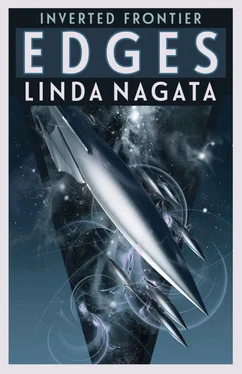Very soon, the ghost returned. It affirmed what she’d inferred over a year ago: The paths to the trunkline were not visible to her. She had no access to them.
A deep breath to gather her courage. The philosopher cells were on the other side of those hidden paths. Once she crossed over, she would be in contact with them, plunged into unfiltered communication with the ship’s murderous composite mind.
She dreaded it. The Chenzeme had murdered her family, her people, her world. She wanted no intimacy with the minds behind those deeds. And still, she held it to be her duty, her responsibility, to learn all aspects of the ship. At the very least, she needed to know why Urban had closed the paths to the high bridge.
So she messaged him: *Hey. We need to talk.
<><><>
He woke his avatar and, still stretching and yawning, came to her in the forest room. She observed the moment he caught up on her recent activity, a wary look taking over his face.
She said, “You know I’ve visited the neural bridge.”
He shrugged, as if to dismiss the topic as anything that might cause him concern. “You’ve been there before.”
“I have. And just like before, I found that part of the bridge is not open to me. The spiral trunkline and all those filaments that link to the philosopher cells—”
“That’s the high bridge,” he interrupted.
“The paths to it aren’t just closed,” she said. “You’ve hidden them. Why?”
“Because I don’t want you there. It would be dangerous.”
She raised her eyebrows, though she gave him credit for the blunt honesty of this answer. “Dangerous for who?” she asked.
“For you, and for all of us.”
“You go there.”
“I’m used to it. I understand it.”
“I want to understand it.”
“No, you don’t. You don’t want to be immersed in Chenzeme thoughts, Chenzeme conversation, millennia of memories, the murder of worlds.”
“You’ve seen that?” she asked, her gut clenching.
“Yes. And you don’t want to experience it. You don’t want it to touch you.”
Clemantine let out a slow breath. “You don’t need to protect me.”
“I’m not sure that’s true.”
“Trust me when I tell you that it is. You’re right that I don’t want to interface with a Chenzeme mind. But I do want to learn this ship, to understand how it operates, how you integrate with it. I want to learn from you what it takes to pilot Dragon —and if the cost of that is intimacy with the philosopher cells, so be it. I’ll take it on.”
His jaw clenched in frustration; he shook his head. “ Why? Why do you feel you need to do this?”
“Because it’s dangerous for me, for you, for everyone, if you’re the only one capable of handling this ship. If something happens to you—”
“Nothing is going to happen to me.”
“I believe you, and still, you shouldn’t be the only one to know.”
<><><>
Intimacy , she’d called it, and Urban found that it was a strange intimacy to feel her ghostly presence overlaid against his own in the branching fibers of the high bridge.
He didn’t want her there. He knew her history, and understood the horror she must feel at interacting so directly with the philosopher cells. He also worried her presence would change the temper of the cells, feeding their suspicions, making it harder to bring them to consensus. Mostly, he resented her implication that he was vulnerable, that he might someday be separated from his ship, that someone else might need to take over.
But none of these objections were sufficient grounds to refuse her request. Clemantine believed she could handle the experience. It would be petty and paternalistic to deny her—and besides, she would never forgive him.
So he’d opened the high bridge to her.
Before her first visit, they’d met in the library. He’d warned her, “If you feel overwhelmed, if you can’t suppress an emotional reaction, I need you to retreat. If you stay, you’ll destabilize the cell field.”
“All right. I understand.”
Clemantine kept her voice level, but even a ghost existence could not mute her escalating anxiety. She closed her eyes, took a few seconds to gather herself. Then she departed for the neural bridge, leaving behind all illusion of physical existence.
A mapped path brought her to the trunkline. From there, a brief, terrifying moment as her awareness flowed to fill the great network of branching fibers. Then she was plunged into the swirling, combative conversation of the philosopher cells. The bridge translated their intent, their emotion, the bite of their hateful aggression.
She recoiled.
*Careful , Urban messaged her, much too late.
Her revulsion and fear spilled across a hundred thousand connections, flooding the cell field. The cells re-echoed her emotions, amplified them, sought the cause behind them as they debated in a complex language she comprehended but could not effectively translate so that she “heard” it only in primitive phrases:
*By the Unknown God , she whispered to Urban—and then she withdrew.
Just like the cells, he had been hit by the force of her fear and revulsion. It left him shaken, but he suppressed that and worked to soothe the philosopher cells.
Simultaneously, he awaited her in the library.
She appeared before him, wild-eyed, lips parted. “You’re there all the time,” she whispered in horror. “Some version of you.”
“Some of the time I use an edited version,” he admitted. “I call it the Sentinel. Low empathy. Emotionally numb.” He tapped his chest. “But it’s still my core persona that makes all the decisions. You could do that too.”
Eyes half-closed, she nodded, visibly recovering her composure. “Right now I need to be able to handle it as me. I’m going back in.”
She shifted from the library to the high bridge. Again, she became a disembodied presence that dispersed to fill the network of fibers, Urban there with her, everywhere. No breath to hold or she would have held her breath against the vicious, tumultuous conversation that engulfed her. Sadistic longings. Frustrated hates. The philosopher cells still restless, still seeking a target that would let them satisfy an instinct to burn/kill/sterilize.
Revolted again, she slipped away, back into the library.
Urban met her there. Saw the shudder run through her. “You don’t have to do this.”
Her fist closed. “I can do this.”
She shifted out of the library, but not to the high bridge. She needed to breathe, so she returned to her core persona. Alone in her chamber, she shivered and gasped, her heart raced, tears escaped to drift in the air around her, reflecting light like precious gems. “I can do this,” she growled aloud. “I can. I can .”
More than ninety minutes slipped past before Urban again felt her join him on the high bridge. This time, she came knowing what to expect; she had prepared herself. He felt her as a calm, glassy presence that allowed the endless conversations of the philosopher cells to pass through her, without touching her.
She stayed there with him, far longer than she’d stayed before.
After a time, she messaged him: *This conversation… it’s like mindless, poisonous froth riding on the surface of an ocean of memory.
*Not mindless , he replied. *The cells are a composite mind operating as minds do.
Later, in the library, he explained it in more detail:
“Each cell has its own senses, a particular awareness, a cache of memories, and a measure of influence in the cell field. That influence waxes and wanes depending on the success of the hypotheses and ideas that it supports. That’s what most of the chatter is: discussion and argument on the meaning of sensory input evaluated against known data. You can enter that debate. The bridge gives you enough influence to command consensus—but you will always need to be careful that the field doesn’t coerce a consensus out of you.”
Читать дальше












